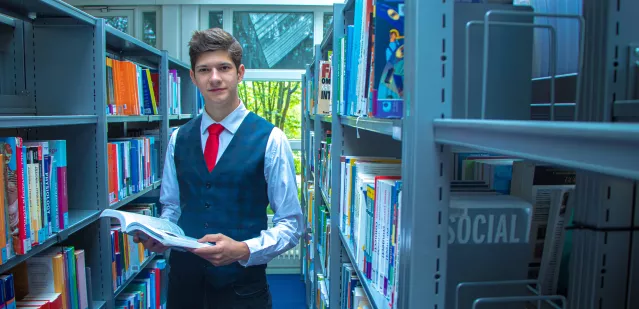
Hands-on education
It meant a complete change of mindset for me. Secondary schools in Hungary prepare you for theory-based university, so I was used to learning a lot of stuff through books. Just reading and rereading the information. Here, it’s very hands-on and I get to find out and research a lot of things myself. I decided to accept the difference and see how useful it would be.”
“I now really enjoy the method. Working on a real issue in teams, hearing other people’s perspectives, coping with different levels of motivation, and fine-tuning a solution to make it work. The first project we worked on focused more on us getting to know how DBE works and getting to know each other, but I really enjoyed the subject matter too. It makes a difference if the topic interests you: it motivates. With one of the projects we looked into how we would want the EU to be organised. It gave us a really good introduction to political science and how intergovernmental organisations can be formed. We got into some really interesting discussions about levels of integration and participation, and I learnt a lot about lobbying and policy-making.”
Changing perspectives
“How much you get out of a project really does depend on your interests and perspectives. The one project I didn’t enjoy so much was on a topic that I didn’t feel was new to me. It focused on intercultural sensitivity, but for me that’s something that just comes naturally. I live with other international students, my best friends have different nationalities, I’m studying in a different country. I’m already culturally sensitive in that respect. And when it comes to working in a team with others, I think the majority of difficulties arise more because of personality conflicts than cultural conflicts. For instance, I get my competitive mindset from playing sports not from being Hungarian.”
Accepting flaws
“With each DBE project, we’re given more and more freedom. The first project was more guided so we knew exactly what we needed to figure out. Now there’s more room for failure – and that’s a good thing. We learn to manoeuvre better. We might for instance start going down a train of thought but through the weekly feedback we get from the lecturers, we question whether we’re doing the right thing. Like with the project on creating a European union, we brought together six different nations and decided to make them a federation. This means they have to work very closely together, yet we had two countries that were complete opposites in some policy matters, like nuclear energy. So although our system was good, it was flawed in this respect. That doesn’t mean it’s wrong, but it does mean we need to think carefully about how this flaw can be managed.”
“The classes we get outside of our DBE projects are all relevant to the topic we’re covering and help us progress as a team. Like learning about different types of leadership and developing debating skills and presentation skills. We can apply this knowledge straight away in our teamwork, but they’re also skills we’ll need in our future careers. Combined with the DBE approach of working on actual cases, it makes the degree far more in contact with the real world. I think I’ll later be able to work anywhere within the EU.”



